Part 23: Crusader Kings: Chapter 23 - The Battle for the East: 1268 - 1280
1268 - 1280: The Battle for the East
The many wars in Italy come to a collective end in the first months of 1268 as Gerhard crushes the Cathar King of Italy under his heel and reclaims the Italian crown.

In the wake of the Muslim victories in Iberia and the rise of the pagan empires in the east, a new wave of religous fervor is spreading through Catholic Europe. In March of 1299, the Pope calls a crusade against Antioch, which has fallen into the hands of the Emir of Edessa. Unhappy with his lowly standing among his peers and desperate for any chance to prove his worth, Bartholomaios takes up the cross and pledges Swabia's armies to the holy cause.

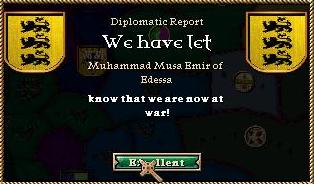
Bartholomaios raises two armies of 10,000 men each, the first leaving Swabia in August, heading towards Venice where a fleet waits to take them to the holy lands. As the army is marching through Austria, Duke Friedrich, still angry over being passed over for the German crown decades ago, rises against Gerhard and declares war on Swabia as well.
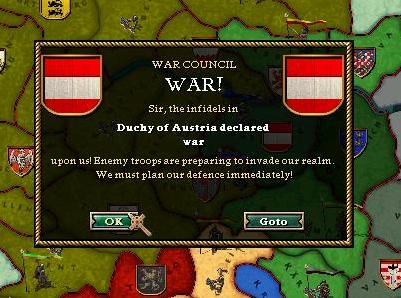
Why Friedrich chose to declare war on Swabia at a time when ten thousand of its soldiers were within striking range of Salzburg, noone knows, but he quickly comes to regret his belligerence as his forces are swept aside by Bartholomaios' numerically superior forces.
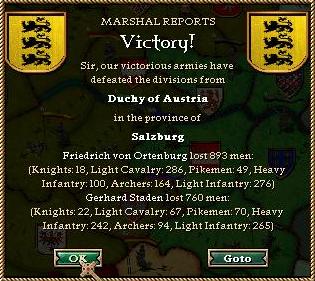
He quickly asks for peace, offering a large sum of gold in tribute. Bartholomaios accepts, and turns his armies back on the path towards Antioch.
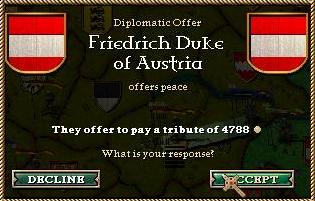
The first army finally arrives in April of 1270, finding themselves beaten to the walls of Antioch by a small army sent by the Count of Innsbruck. Not content to simply help the Count seize Antioch, Bartholomaios turns his army towards Alexandretta instead.
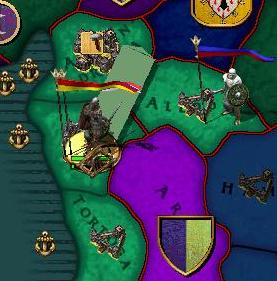
The armies of the Emir offer little resistance, and the city falls after a two-month long siege.
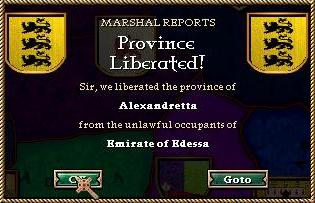
Bartholomaios turns south towards Tortosa, attacking the tiny Saracen army defending it. Against the advice of his Marshal, he leads his knights in a reckless charge against the Saracen cavalry that was to be his last. As the German knights charged at them with banners flying, the Saracens simply fell back in mock retreat and then swept in on them from all sides. By the time relief arrived from the rest of the Crusading army, Duke Bartholomaios was dead.
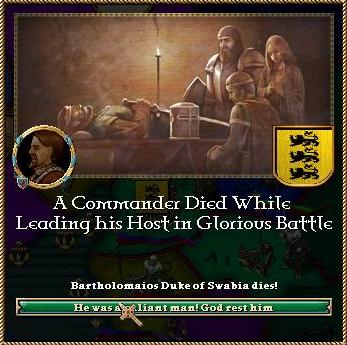
Mourned by few, he is succeeded by his eldest son, Konrad. Having turned his back on both the Greek heritage of Konstatinos von Hohenzollern and the bumbling arrogance of his father, Konrad nonetheless has an arbitrary streak to his character.

Despite Bartholomaios' death, the Crusade goes on, and the Emir of Edessa is defeated in April of 1271. He is forced to cede Alexandretta and Adina to Konrad, while the Count of Innsbruck assumes rulership over Antioch.

The Pope declares the Crusade to be at an end two months later.

Under the last three Popes, the Papal States have grown significantly. The Holy Father now controls nearly all of south Italy and parts of Sicily, and since Gerhard seems to have little interest in Italy beyond wearing its crown the Papal State is now the chief rival of Burgundy for dominance of the peninsula.

Peace is finally settled between Finland and Lithuania in face of the continuing advance of the Mongols. Finland comes out as the clear loser of the war, nearly all of its russian lands now in the hands of the Mongol Khan, and significant portions of Finland itself lost to the Lithuanians.
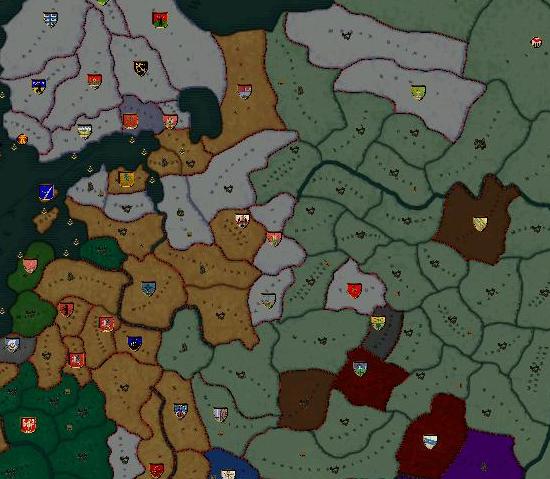
Konrad reaches majority in 1272.

In a shrewd political move he marries the daughter of King Gerhard, thus forming a marriage alliance with the Stadens and gaining their support for his bid to succeed Gerhard.

This arranged marriage quickly becomes one of love, as Konrad and his new bride find themselves getting along very well indeed.
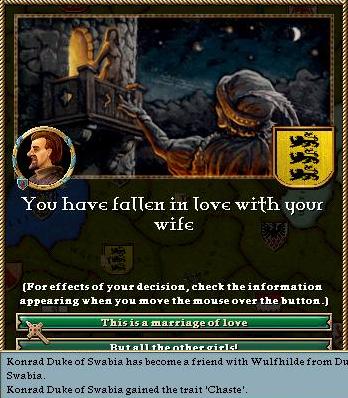
Ill news intrude on the celebrations as King Gerhard declares war on France a mere month after the marriage. The French and German Kings have been bickering over Lorraine for years, and inspired by his successes in Italy, Gerhard has decided to force his claims through at the point of a sword.

Even worse news arrive shortly thereafter, as the Count of Baden has died without leaving heirs, and his lands have gone to his cousin, the Count of Chernigov in Russia. Baden is lost to Konrad, much like Furstenburg was once lost to his ancestors.
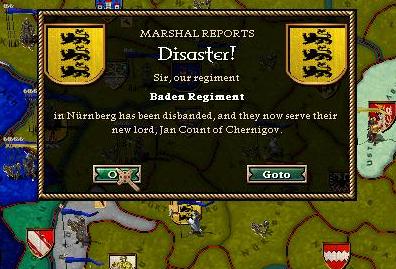
Regardless of these setbacks, Konrad is quick to respond to his liege's summons, and arrives to join the army invading Lorraine in October of 1272. He personally leads his troops into battle, flanking a French army defending Andernach and breaking its morale with a skillfully directed attack.

Despite early successes, the war quickly turns into a stalemate, dragging on for months as one side gains the upper hand, and then the other, again and again.
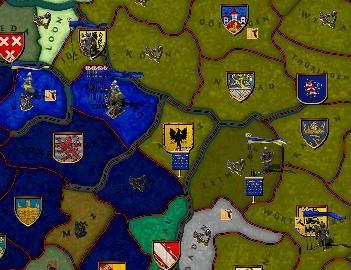

The war is still raging in 1274 as the construction of the new Castle Wurttemberg, modeled after the great keeps of the Holy Lands, stands complete. The Hohenzollern duchal seat now rivals the Imperial Castle in Mainz both in size and grandeur.
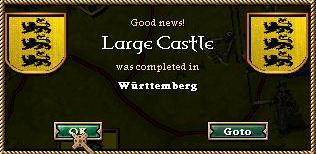
In 1275, news reach Germany that the Sheik of Petra, a Sardinian vassal, has succeeded in overthrowing his liege and usurped the Sardinian crown, returning control of Tunisia and Tripoli to the Muslims.

After a long string of daughters, a son and heir is finally born to Konrad and Wulfhilde in 1277.
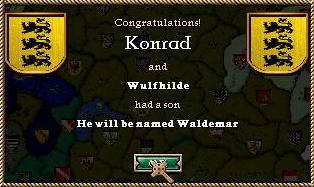
The French-German war finally ends in 1278 as a white peace is signed. Six long years of war, and all either side has to show for it is an utterly devastated Lorraine. Konrad has come through the war uninjured and having learnt much of tactics and siege warfare.

As tends to be, the end of one war signals the beginning of another. Bohemia has invaded Lithuania, which is already weakened from a decade of warfare with the Horde, and the Finnish King, strengthened by an alliance with Sweden and dreaming of restoring the Empire, makes his own declaration of war against the Lithuanian King. In response, Lithuania's ally Georgia declares war on Finland, Bohemia and Sweden.
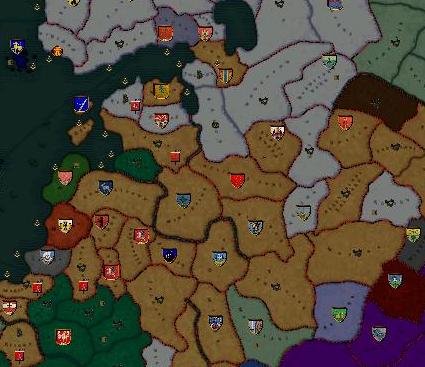
Six powers now battle for the rights to rule over the people of Rus.